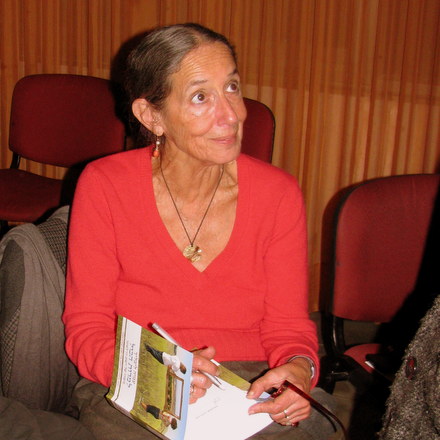Home > Oasis of Peace > Community > "Against All Odds"
"Against All Odds"
Sunday 20 January 2013

January 14, 2013: Amia Lieblich, whose book "Against All Odds: the story of a binational village" (Hebrew) was officially launched on December 24, was invited to "re-launch it in a special meeting for the community members. Her book, which is composed largely of interviews, tells the story of the village through the personal stories and narratives of the village members.
Lieblich, a psychologist and writer, who is also known for her books on three other communities, said that she found it to be a special challenge to write about Wahat al-Salam Neve Shalom, due to the sensitivities of dealing with a binational village and the fact that she was able to conduct the interviews only in Hebrew. She said, however, that she "feels this is important because of the vision, the dream" that the community represents. She said that she learned to respect what she heard, while realizing that she had not heard everything: "Not everything was stated." Her ambition for the book is that "it will
remain a historic document." What is emphasized is less the community but "the personal level." It is an attempt to see the place in its wholeness through a mosaic that slowly fills." In each meeting, she "attempted to give full attention, without judgment or argumentation". "When you listen, you get to hear stories. This is the secret of the profession [of being a writer]."
In her general comments to the community, she said that, looking at the interviews as a whole, she finds "both pride and disappointment. Pride that [the venture] continues to attract more people to it, and in the educational projects. Many spoke of their pride. This is independent of doubts and tensions, which exist everywhere - especially in such an ambitious project." She said that "people in the village are taking much for granted that would not be taken for granted outside. And maybe people forget this, especially the young people."
On the other hand "there is disappointment, which seems to be greater. This leads to personal and collective crises." People raise "many questions about what has happened and about [opportunities] missed." They "tend to defend themselves by saying that they are ’just living here’... some said that this is a ’normal place also’, with all the everyday problems. Not everything is political: there are normal challenges and conflicts." There seems to be "a change in vision of the village as a normal place."
Responses expressed by residents during the meeting were just as interesting. Michael Kariyanni said he feels that the book presents an accurate and authentic picture. As in real life, the book is "very much a dialogue with those who are absent. I’m usually asked about the village by people who do not live here." I often wonder whether we are the only normal people in a society that is gradually going crazy, or whether we are the crazy ones. In America, no one would make a big deal about a mixed black and white community as "this is already passé."
Various people discussed the idea of "normality", and whether they saw the community as "normal". Tamar Frish said "Really our life here is normal - quite banal - despite how it looks from outside. But she also said that it is interesting how people, in telling the story of the village, had seen the same events differently. Her initial urge was to protest that they are mistaken. But then, she said, this made her realize that "there is not one single truth or way of seeing things." We should also remember that the story is told at a single point in time, while life continues."
But the book also tells the stories of people whose lives do not continue, bringing poignant memories of Abdessalam, Ahmad and Adam, who all died in 2012, after their words had been recorded. Many of the interviews relate to personal pain. Lieblich says that this is partly the result of her role as interviewer, and the phenomenon that when someone offers a gentle ear, there is a tendency to unburden oneself. "People leave aside the good things as if these are to be taken for granted."
Connected with this is the tendency to speak to the interviewer of matters that have not found a suitable forum in the community itself, so that many people mentioned having learned something new about persons with whom they had been living for many years. "It isn’t just a question of [unknown] facts" as someone said, but more of unspoken feelings. Although (as Coby Sonnenschein pointed out) the community itself is not the intended audience for the book, some people hoped that the book might open new opportunities for dialogue.
Yair Ben Shabat said, "What I take away from the book is the story of dealing with the conflict. I hope this is what gives people inspiration. It does not tell the "story of the village", but of the people who live here, who deal with the challenges."
Finally: many thanks to Ms. Lieblich for her generous decision - mentioned at the meeting - to donate the royalties from her book to Wahat al-Salam Neve Shalom.
View online : למרות הכל סיפורו של יישוב דו-לאומי

